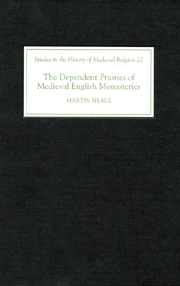Book contents
- Frontmatter
- Contents
- List of Figures and Tables
- Dedication
- Acknowledgements
- Abbreviations
- Maps: The Dependent Priories of the Monasteries of Medieval England (England and Wales)
- Introduction
- Part I The Dependent Priory as Daughter House
- 1 The Foundation of English Cells
- 2 The Constitutional Affairs of English Cells
- 3 ‘A Source of Weakness’? Mother Houses and their Daughters
- Part II The Dependent Priory as Small Monastery
- Appendices
- Select Bibliography
- Index
- Other Volumes in Studies in the History of Medieval Religion
2 - The Constitutional Affairs of English Cells
from Part I - The Dependent Priory as Daughter House
Published online by Cambridge University Press: 12 September 2012
- Frontmatter
- Contents
- List of Figures and Tables
- Dedication
- Acknowledgements
- Abbreviations
- Maps: The Dependent Priories of the Monasteries of Medieval England (England and Wales)
- Introduction
- Part I The Dependent Priory as Daughter House
- 1 The Foundation of English Cells
- 2 The Constitutional Affairs of English Cells
- 3 ‘A Source of Weakness’? Mother Houses and their Daughters
- Part II The Dependent Priory as Small Monastery
- Appendices
- Select Bibliography
- Index
- Other Volumes in Studies in the History of Medieval Religion
Summary
The recorded history of English dependencies is littered with disputes. The many altercations involving cells, including some of the most interminable litigations known to medieval England, arose largely because daughter houses fell awkwardly between competing jurisdictions. The mother house, the cell itself, its patron and the ordinary (and to a lesser extent king and pope) all competed first to establish and then to defend the rights they believed were justly theirs. The normal relations between a monastery, its patron and its ecclesiastical overseer were thrown into confusion by the insertion of an additional jurisdiction, a mother house, whose jealous control of its daughter threatened to deprive its rivals of their accustomed powers. It was to take many decades, sometimes centuries, before workable compromises between abbey, patron and bishop were found. Relations between mother houses and their daughters were no less complicated. Some satellites were extremely tightly controlled by their parents; others were allowed a considerable measure of freedom in practice. Occasionally, serious disputes arose between abbeys and their dependencies and a number of cells even succeeded in extricating themselves to some extent from the grip of their parents. It is easy to exaggerate the storminess of these various relationships, since the surviving sources tend to emphasise discord rather than harmony. Nevertheless, a detailed examination of the ways in which the interests and expectations of the different parties clashed is necessary to make sense of the catalogue of disputes which dominate the recorded histories of so many dependent priories.
- Type
- Chapter
- Information
- The Dependent Priories of Medieval English Monasteries , pp. 64 - 113Publisher: Boydell & BrewerPrint publication year: 2004

